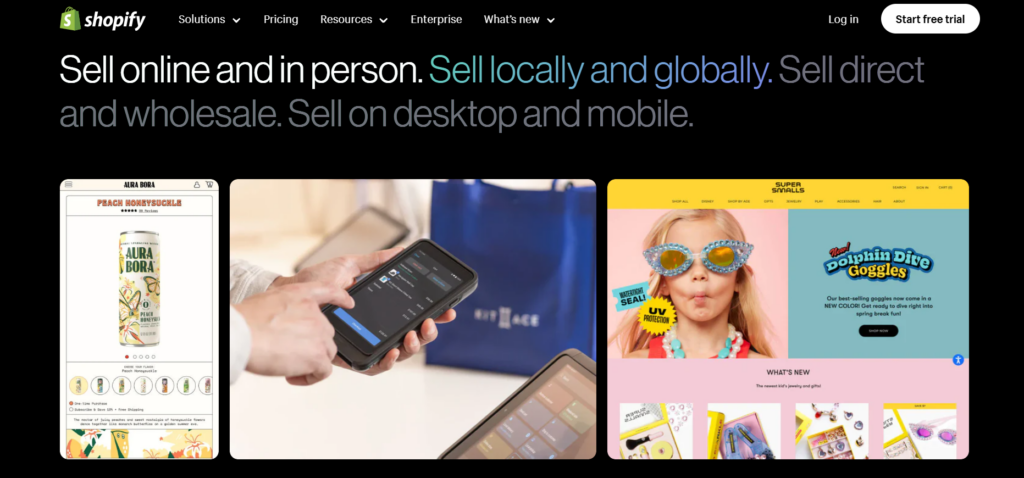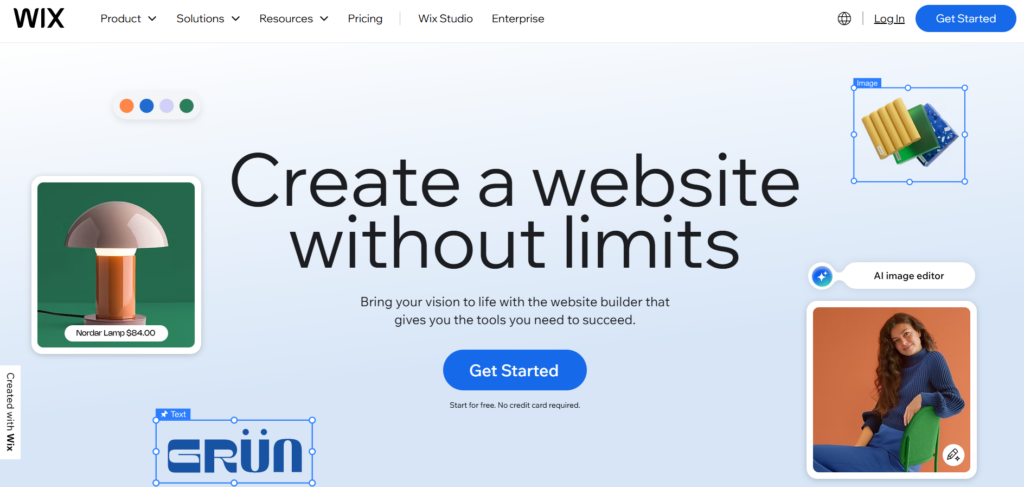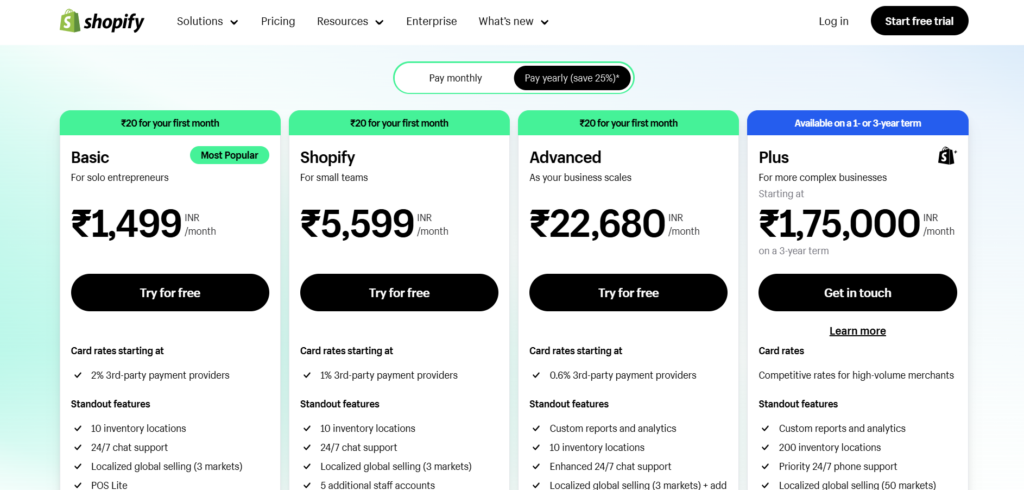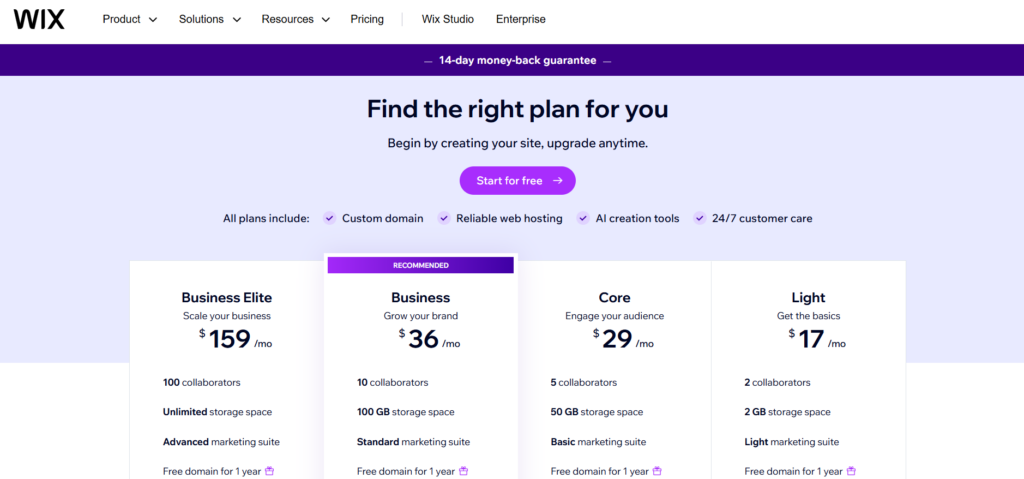When I was comparing Shopify and Wix, I noticed they cater to different needs. Shopify is built specifically for e-commerce, offering powerful tools to manage products, payments, and shipping.
Wix, on the other hand, is a flexible website builder with e-commerce features as an add-on, making it great for smaller or less complex stores.
If you’re focused on selling and want a platform that can scale as your business grows, Shopify is the best choice.
But if you need a simple, beautifully designed website with light e-commerce, Wix might be a better fit. It’s easier to customize for non-tech-savvy users, though it’s not as robust for managing a large store.
This guide will compare their features, pricing, and who they’re best for so you can decide which platform suits your goals. Let’s find out whether Shopify or Wix is the right choice for you!
Shopify
Shopify is a leading e-commerce platform that enables individuals and businesses to create and manage online stores with ease.

It offers a comprehensive suite of tools for website design, payment processing, inventory management, and marketing.
Shopify supports businesses of all sizes, from small startups to large enterprises, with customizable templates, integrations, and apps. Its user-friendly interface and powerful backend make it accessible for non-technical users while providing advanced features for developers.
Shopify also supports multichannel selling, allowing businesses to connect with customers across social media, marketplaces, and brick-and-mortar locations, empowering entrepreneurs to grow and scale their online presence efficiently.
WIX
Wix is a popular cloud-based website building platform that allows users to create professional websites without coding.

Known for its drag-and-drop editor, Wix offers customizable templates, making it ideal for businesses, e-commerce, blogs, and portfolios.
It provides integrated tools like SEO optimization, marketing features, and app market extensions to enhance functionality.
With robust hosting, Wix ensures fast loading and reliability. Advanced users can utilize Wix Velo for coding customizations.
Its pricing plans cater to diverse needs, from free basic sites to premium plans with custom domains and advanced tools. Wix empowers creators with flexibility and user-friendly design capabilities.
Features Comparison: Shopify vs Wix
Below is a detailed comparison of Shopify and Wix across several key dimensions:
| Feature | Shopify | Wix | Winner |
|---|---|---|---|
| Ease of Use | Tailored for e-commerce with user-friendly setup and tools. | Beginner-friendly with drag-and-drop design tools. | Tie |
| E-Commerce Functionality | Comprehensive tools: inventory, payments, shipping, and taxes. | Basic e-commerce tools; lacks advanced functionality. | Shopify |
| Design and Themes | Over 100 professionally designed themes, all mobile-responsive. | 800+ templates, not all optimized for e-commerce. | Shopify |
| Customization | Extensive customization through coding and apps. | Drag-and-drop editor; limited advanced customization. | Shopify |
| App Ecosystem | 8,000+ apps tailored to e-commerce needs. | 250+ apps with fewer e-commerce-specific options. | Shopify |
| Scalability | Built to scale for large businesses with high sales volume. | Best for small to medium-sized stores; struggles with scaling. | Shopify |
| SEO Features | Strong SEO tools, including customizable URLs and metadata. | Good for basic SEO but limited advanced e-commerce SEO. | Shopify |
| Payment Options | Shopify Payments and 100+ third-party gateways supported. | Limited integrations; Wix Payments available. | Shopify |
| Fees | Transaction fees if not using Shopify Payments. | No transaction fees, but fewer payment gateways available. | Depends on needs |
| Support | 24/7 support via chat, email, and phone. | 24/7 support but less specialized for e-commerce. | Shopify |
| Multi-Channel Selling | Supports selling on Amazon, Facebook, Instagram, and more. | Basic multi-channel options. | Shopify |
| Mobile App | Fully functional mobile app for managing store and sales. | Limited mobile management features. | Shopify |
| Pricing | Starts at $39/month, higher tiers for advanced features. | Starts at $27/month, but features are limited in lower tiers. | Depends on budget |
Pricing Comparison: Shopify vs Wix
Here’s a pricing comparison of Shopify and Wix, detailing the tiers and what’s included in each:
Shopify Pricing
Shopify offers a range of pricing plans tailored to various business needs in India:

1. Starter Plan:
Priced at ₹399 per month, this plan is ideal for selling products through social media platforms and messaging apps. It does not include a full online store but allows for the creation of product links and buy buttons.
2. Basic Shopify:
At ₹1,499 per month (billed annually), this plan provides a complete online store with unlimited products, two staff accounts, and basic reports. It’s suitable for new businesses starting their online presence.
3. Shopify:
For ₹5,599 per month (billed annually), this plan includes all Basic features plus professional reports, five staff accounts, and standard reporting capabilities, making it ideal for growing businesses.
4. Advanced Shopify:
At ₹22,680 per month (billed annually), this plan offers advanced report building, up to 15 staff accounts, and third-party calculated shipping rates, catering to larger businesses with more complex needs.
5. Shopify Plus:
Starting at ₹1,75,000 per month on a 3-year term, this enterprise-level solution provides advanced features and customization options for high-volume businesses.
Please note that transaction fees apply when using third-party payment providers, varying by plan. Additionally, Shopify periodically offers promotional rates, such as ₹20 for the first month on select plans.
Wix Pricing:
Wix’s pricing is structured to cater to various user requirements:

1. Free Plan:
Offers basic website creation with Wix branding and a Wix domain.
2. Light Plan:
At $17 per month (billed annually), this plan removes Wix ads, allows connection of a custom domain, and provides 2GB storage.
3. Core Plan:
Priced at $29 per month (billed annually), it includes e-commerce capabilities, 50GB storage, and access to business apps like Wix Bookings.
4. Business Plan:
For $36 per month (billed annually), this plan adds advanced e-commerce features, 100GB storage, and automated sales tax.
5. Business Elite Plan:
At $159 per month (billed annually), it offers unlimited storage, priority support, and additional advanced features.
Why Shopify’s Pricing Justifies the Cost
1. Value for Money: Shopify’s higher pricing reflects its robust e-commerce tools and scalability, which Wix cannot match at similar price points.
2. Transaction Fees: Shopify Payments eliminates transaction fees, potentially offsetting higher subscription costs.
3. High-Tier Features: Shopify’s mid- and high-tier plans offer advanced features (e.g., international domain handling, shipping discounts, and analytics), making it worth the investment for serious sellers.
4. Scalability: Shopify’s plans grow with your business, providing tools for larger businesses that Wix does not support.
Wix may be a budget-friendly option for small-scale stores, but Shopify offers better value for businesses looking to scale and succeed in competitive e-commerce markets.
The Final Verdict
Shopify is the superior choice for businesses focused on e-commerce. While Wix is great for building general websites with its intuitive drag-and-drop editor, its e-commerce capabilities are less robust.
Shopify provides advanced tools tailored for online selling, including inventory management, integrated payment processing, and scalable solutions for growing businesses.
With a vast app ecosystem and dedicated support, Shopify ensures a seamless experience for e-commerce entrepreneurs. For those prioritizing powerful, specialized e-commerce features, Shopify clearly outshines Wix.
FAQ’s
Which is better for e-commerce?
Shopify is better for serious e-commerce, while Wix is more suited for small or simple stores.
Is Shopify more expensive than Wix?
Yes, but Shopify offers more advanced e-commerce tools and scalability.
Can I sell on social media with Wix?
Yes, but Shopify offers better multi-channel selling options.
Which is easier to use?
Wix is easier for beginners; Shopify requires a slight learning curve but offers more power.
Does Shopify charge transaction fees?
No fees with Shopify Payments; up to 2% with third-party gateways.
Which has better SEO features?
Shopify provides stronger e-commerce-specific SEO tools than Wix.


